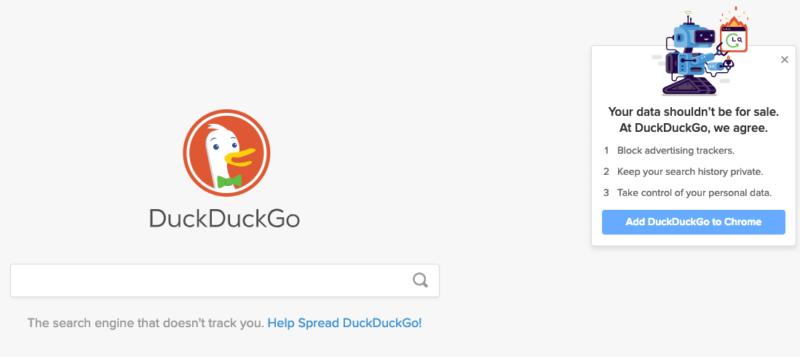Google has reportedly introduced new options into the list of potential “default” search engines available to Chrome users. Most notably, DuckDuckGo has now become one of those options in 60 markets around the world.
DDG joins the list. In the past users were always free to manually add alternatives to the existing choices, which included Google, Bing, Yahoo, Ask and AOL in the U.S. However, the overwhelming majority of Chrome users don’t do that kind of customization; Google is the default default engine.


DuckDuckGo has also offered a Chrome extension. It prompts users that don’t have the extension currently installed with its privacy pitch: “your data shouldn’t be for sale.”
According to TechCrunch, DuckDuckGo has been added in 60 markets, including Argentina, Australia, Belgium, Brazil, Canada, Germany, Denmark, Finland, Greece, India, Mexico, Philippines, South Africa, U.K. U.S. and numerous others.

More visibility. Chrome is the world’s most popular browser, with a 62 percent market share globally. In the U.S., according to StatCounter, the market is more competitive:
- Chrome — 49.3 percent
- Safari — 31.6 percent
- Microsoft browsers — 9.8 percent
- Firefox — 4.5 percent
- Others — 4.8 percent
The addition of DuckDuckGo to the list of Chrome default options will undoubtedly provide a PR boost. We’ll see whether it drives addition adoption and search volume.
The company’s privacy friendly message has been resonating with many users, which has partly resulted in the search engine’s increasing query volumes. DuckDuckGo CEO Gabriel Weinberg testified yesterday before Congress on privacy and online advertising.
Why you should care. If current trends continue it’s not outrageous to suggest DuckDuckGo’s market share could eventually exceed Yahoo’s. It outperformed Bing in terms of user engagement in a 2016 analysis by SimilarWeb.
SEOs will want to pay attention to whether more traffic starts coming from DuckDuckGo and think about optimizing for it. Yelp performs well for local queries on DuckDuckGo, so optimizing for Yelp can help locally-focused businesses rank.
A Google Analytics note. Speaking of tracking … Chrome may consider DuckDuckGo a search engine, but Google Analytics still doesn’t count it among the 50 odd default search engines it categorizes under organic. DuckDuckGo traffic instead registers as referral traffic unless you set up a filter to recategorize it as organic traffic.
